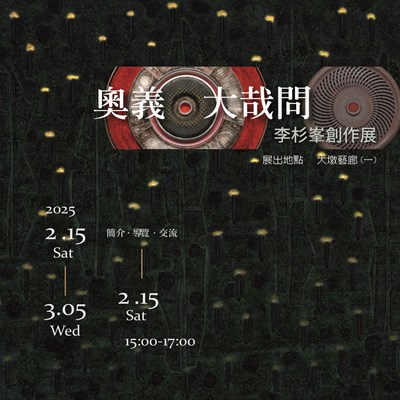
After two decades, Li Shan-feng returns with a solo exhibition at the Dadun Cultural Center’s Da Dun Gallery I. Titled “The Profound Questions,” the exhibition showcases his artistic exploration inspired by martial arts such as Taiji, Xingyi, and Bagua, alongside literary influences from British author Lobsang Rampa’s depiction of Tibetan monastic life in The Saffron Robe and Stephen Hawking’s Brief Answers to the Big Questions. Through their works, Li contemplates philosophical inquiries like “Where do humans come from?” and translates these reflections into his creative expressions. The exhibition will run until March 5, and the public is welcome to come and enjoy it.
Li Shan-feng, born in 1950, is a graduate of the National Taiwan Normal University’s Fine Arts Department. Over the years, he taught at Lukang Senior High School, Changhua Senior High School of Commerce, and Taichung Public School of Commerce in Taiwan (now National Taichung University of Science and Technology) before retiring in 2010. Li’s works incorporate a variety of mixed media, transforming everyday materials—ranging from wood to recycled cardboard—into an artistic language that conveys thoughts and emotions. He blends painting with design, utilizing composite media and diverse techniques to form a unique artistic style. Since 2011, he has adopt symmetrical compositions centered around a central axis, infusing his works with rich oriental elements. His art is highly decorative yet deeply philosophical, reflecting profound emotional depth.
Li Shan-feng recalled that he encountered Buddhism at 46, spending more than two years meditating at a monastery, which gave him an initial grasp of Mahayana principles. As he grew older, he started to seek a balance between spiritual detachment and worldly engagement, shifting his focus toward composure and introspection while exploring philosophical inquiries about the universe and life. He believes that learning Buddhism is merely a starting point, there are many deeper wisdom yet to be learned. During this journey, he extensively studied Nan Huai-chin’s writings and was deeply influenced by his enlightenment, which integrate Confucianism, Buddhism, and Daoism. These insights have significantly shaped his artistic vision.
Li Shan-feng’s artwork Realm of Radiance showcases carefully cut and aligned wooden strips, forming a structure full of mystery. The contrast between the randomly cut shapes at the bottom and the precisely aligned wooden elements above evokes the image of stars shining in the universe. These scattered points of light symbolize the energy of life, emanating a subtle grandeur. Using collage techniques, Li transforms these elements into a visual representation of his thoughts and emotions. More than just an artwork, this piece offers a symbolic interpretation of the universe, life, and starlight. Through the placement of luminous points and a thoughtful use of color, the piece invites viewers to immerse themselves in its enigmatic power.
According to the Cultural Affairs Bureau, Li Shan-feng first exhibited his collage art at the Dadun Cultural Center in 2001. After more than 20 years of artistic exploration and reflection, he returns with an exhibition that encapsulates the essence of his past works and marks the beginning of a new creative chapter, symbolizing a significant moment in the art scene. His works encourage viewers to reflect on the meanings of the universe and life.
On February 15, the exhibition opened with a special event featuring “Li Shan-feng—Introduction, Guided Tour, and Dialogue,” which received an enthusiastic response. During the exhibition, he will host “Art Conversations, Discussions, Gathering with friends” sessions every Saturday and Sunday from 10:00 to 11:30 AM and 3:00 to 4:30 PM. We warmly invite everyone to join him in thought-provoking discussions, exploring profound questions and inner reflections. Please visit the Dadun Cultural Center’s website (www.dadun.culture.taichung.gov.tw) for more information.

 Facebook
Facebook
 Twitter
Twitter
 LINE
LINE